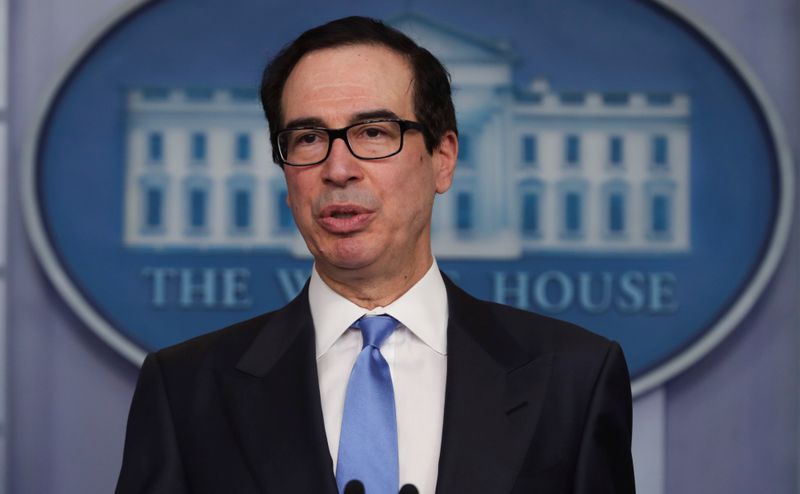By David Lawder and Sarah N. Lynch
WASHINGTON (Reuters) - U.S. Treasury Secretary Steven Mnuchin warned on Wednesday that companies that received coronavirus rescue money intended for small businesses could be investigated if it appears they did not really need the money.
Mnuchin said on Fox Business Network it was "questionable" whether some larger companies qualified for the Paycheck Protection Program (PPP), based on a self-certification step in the loan process. He said businesses need to look carefully at their applications to be sure they can certify that the forgivable loans of up to $10 million are necessary.
As Congress readies another $310 billion in payroll loan funds for small businesses shut down by the coronavirus, Mnuchin's comments indicate the administration is paying more attention to oversight during this round of funding.
The initial $349 billion in small business loan funds, depleted in less than two weeks, went to companies including sandwich chain Potbelly Corp (O:PBPB) and steakhouse operator Ruth Hospitality Group (O:RUTH), prompting complaints that smaller, independent restaurants and "mom and pop" businesses were squeezed out.
Burger chain Shake Shack (N:SHAK) returned its $10 million loan on Monday after it was able to raise $150 million in capital in a stock offering.
Harvard University on Wednesday decided to forego the $8.6 million it was allocated under a separate coronavirus aid program, the Higher Education Emergency Relief Fund, after President Donald Trump questioned whether the elite school needed the money.
In the PPP application form, companies need to certify that "current economic uncertainty makes this loan request necessary to support the ongoing operations of the applicant."
"I think a lot of these big companies, it's questionable whether they can make that certification; I think they should review it," Mnuchin told Fox Business Network.
Companies that apply and later decide they cannot certify their need for funds should "pay back the money quickly," Mnuchin said. "There will be no liability to Treasury and the SBA. ... If they don't, then they could be subject to investigation."
The potential for fraud in the $2.2 trillion coronavirus rescue legislation is high, a senior U.S. Justice Department official told Reuters.
The agency's criminal division plans to closely scrutinize the PPP using data analytics techniques similar to those used to sniff out healthcare fraud.
"The concern we have is that you are going to see all manner of potential fraud," said Brian Benczkowski, assistant attorney general of the Justice Department's Criminal Division.
"There is a potential there will be fraudulent or false statements on the loan applications to the banks. You might see non-existent businesses attempting to dummy up paperwork to see whether or not they can get that through the process at the bank and get access to a loan," he said.
Companies also might try to inflate payroll numbers or amounts or claim they spent the money on payroll in order to get the loan forgiven, when the funds went to other purposes, he added.
The division will closely watch other Treasury-run programs, including a Federal Reserve lending program for mid-size companies and municipal bond markets.
Multiple watchdog groups have been created to audit the $2.3 trillion program, including a committee made up of inspectors' general, with an $80 million overall budget.
Mnuchin said the Treasury programs would ultimately help some 60 million American workers, or close to half of U.S private sector payrolls.
Most, if not all, of the U.S. economy should be reopened by later in the summer, Mnuchin said, after a devastating shutdown to try to stem the spread of the novel coronavirus.

"We're looking forward to, by the time we get to later in the summer, having most of the economy if not all of the economy open," Mnuchin said.